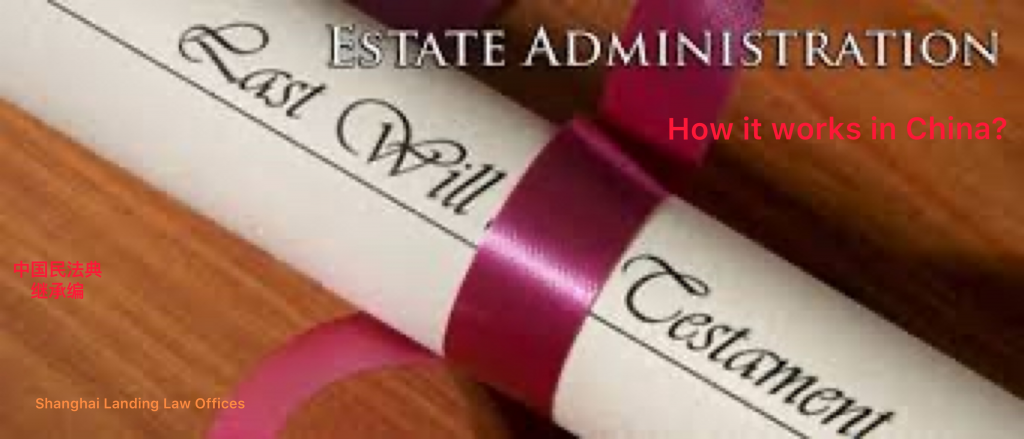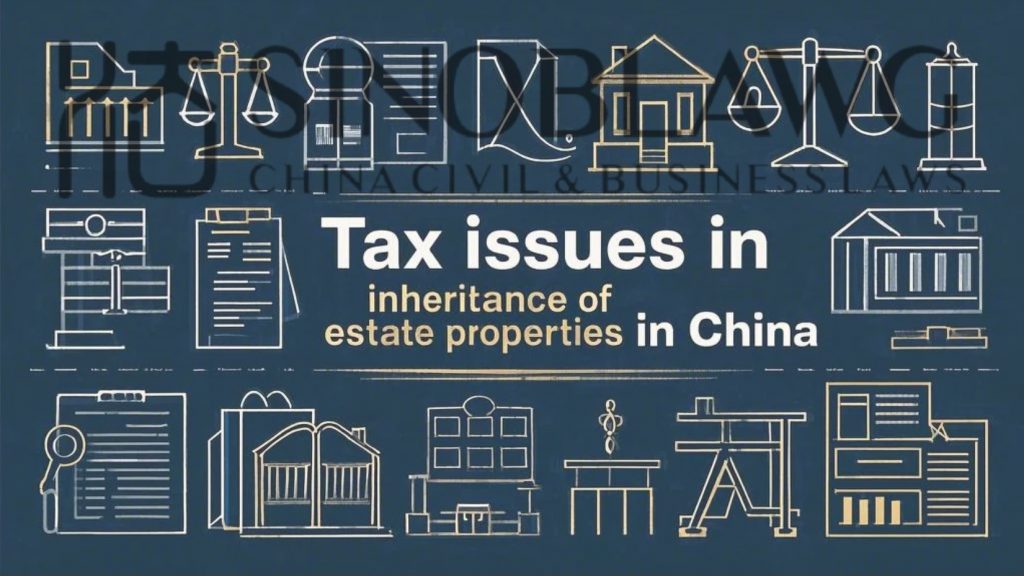Estimated reading time: 7 minutes
You may have known that China has enacted its first ever Civil Code incorporating and codifying quite a few pieces of separate civil laws into one statute. The old China Succession Law was refreshed and replaced by the Succession chapter in the Civil Code.
In the Succession Chapter of the Code, there are quite a few significant changes made to the old China Succession Law among which are rules that require the appointment of administrator for estates in China. We have done a post a while ago briefly introducing such new law on administration of estates in China.
I. Mandatory Appointment of Estate Administrator
Before the Civil Code, China doesn’t really have well-established rules regarding administration of estates. When a person dies, it is generally up to all heirs and beneficiaries and stack-holders to work out a plan among them to carry out inheritance of the estates. Regardless of any valid will in place, if any heirs or beneficiary entitled to the estate is not happy and refuses to cooperate with others, then the parties shall have to go to courts for a resolution to get the inheritance done.
Now Article 1145 of the Code provides:
When an inheritance starts, the executor in a will is the administrator for the estates; where there is no executor, the heirs shall timely recommend and select an estate administrator; where the heirs fail to recommend and select such an administrator, all heirs shall concurrently serve as administrators; where there is no heir or all heirs waive their rights in the estates, then the civil department of local government or village commission shall serve as administrator for such estates.
Article 1145 of China Civil Code Mandating the Appointment of Estate Administrator.
According to this provision, it is now a mandatory requirement to have an administrator for any estate administered in China. In the meantime, according to Article 1146, if there is a dispute over the appointment and selection of administrator(s), then the matter shall be submitted by any interested party to courts for resolution.
The other provisions following Article 1145 clarifies on the role, duty, remuneration and liabilities of an estate administrator.
II. Duties and Responsibilities of Estate Administrator
It is customary practice in most jurisdictions to have an administrator for an estate left by the deceased. China is aligning itself with the world standard practice by making the installation of estate administrator mandatory in the Civil Code, but these provisions in the Code are a far cry from perfection pending further guidelines from China Supreme Court.
Article 1147 of the Code spells out the duties of an estate administrator in China:
The following duties and responsibilities shall be performed by an estate administrator:
(1) ascertain and sort out estates and make an inventory thereof;
(2) report on the estates to the heirs;
(3) Take necessary measures to prevent damages or loss of the estates;
(4) deal with the claims and debts of the deceased;
(5) divide and distribute the estates according to the will or intestate rules;
(6) take such other necessary actions in relation to the administration of the estates
Article 1147 of China Civil Code
Apparently, this concise provision while outlining the scope of the duties is far short of details that are needed to enable a fully functional estate administrator:
(1) the most desired function for an estate administrator is the power to investigate assets held or controlled by any third party, including financial institutions such as banks, securities firms. Unfortunately, the Code fails to empower an administrator in that regard.
We know from our interaction with estate practitioners in most other jurisdictions, either executor or administrator will be officially empowered through court probate proceeding in the form of grant of probate or letters of administration. However, it remains to be seen how China will empower its estate administrators to perform their duties of ascertaining and sorting out specific assets comprising the estates.
(2) Capacity to sue on behalf of estates. This is also a critical role for an estate administrator since very often the administrator may need to take legal action to assert claims against obligators of the deceased or defend the estates against other claimants. Again, the Code or other China laws are silent on this. Under China Civil Procedure Law, plaintiffs are generally parties that are substantively interested in the matters being adjudicated by courts. An estate administrator, except one who is also an heir, can be a person that is not personally entitled to the estates, thus not having the capacity to participate in court actions.
Despite such shortcomings of the law for the time being, this development is still positive in this area of legal practice, and over time, it may be improved and functions well.
III. Implications on Estate Planning over your China Assets
We did quite a number of posts in the past concerning estate planning over assets in China:
How to deal with estate planning over China assets generally;
Should I write a separate will for my China assets?
What A Foreign Executor can do about estates in China
But we have not touched on the issue of appointing estate administrator in details.
(1) Appoint Executor in your Will for China Assets
For people who are working on their estate planning over China assets, it is now advisable and sensible to look at appointment of the executor in your will and testament.
You may wonder whether you should appoint a person in China to your executor in order to serve the purpose of estate administration on the ground here. The answer should be “it depends”.
When there are quite a few items of estate assets in China requiring dealings with third parties, if your executor is a foreigner outside China, that may cause problem. Because third parties (holding or controlling estate assets) may only be willing to work with the administrator than anyone else under the new rules.
However, if you only have only one piece of real property or simple item of estates, I don’t think it necessary for you to appoint a Chinese relative or attorney to be your executor. Despite your executor being outside of China and unable to physically administer the estates in China, he or she or they can still appoint lawyers like us to help with completing the inheritance of the estates.
Again, we remind people from common law jurisdictions that in China laws, family trusts are not well established and the concept of trustee is not popular in family settings, and they shall be careful in choosing their executors and trustees in their last wills and testaments.
(2) Appoint Your Administrator in China in the Case Inheritance Has Started
Well, if the inheritance has started already (meaning the family member has passed away), the heirs and the beneficiaries shall need to decide on their choice of estate administrator in China.
If unfortunately, the executors appointed in the last wills and testaments are foreigners who cannot come over to China esp amid the ongoing covid-19 pandemic, it remains unclear about how estate administration can be carried out remotely. When there is no need to deal with third party for ascertaining and sorting out estates, then the executors or the heirs together can appoint China lawyers like us to help with carrying out the inheritance.
On the other hand, if there is no executor appointed in the will or there is no will at all, then the beneficiaries and/or heirs may come to an agreement on choosing a China attorney to serve as administrator.
IV. We Are Here For You
While there is a lot pending clarification from authorities in terms of how an estate administrator shall function to serve its intended purpose, it is obvious that the role of an estate administrator will become more important. Due to the potential complexity of administering huge estates, it is wise to choose estate attorneys instead of friends or relatives to take up the role and get the job done.
Besides being appointed as estate administrators, your China lawyers can also be your legal counsel navigating you and your administrator in China through the process of estate administration.








Good day,
We are a Fiduciary company in South Africa namely ALK Executors. We are dealing with the Estate for a Mr K Young.
Mr Young had a bank account with The Bank of China. Please can someone get back to us with regards to the process of closing the said Bank account in China.
We trust you find the above in order and look forward to receive your prompt response herein.
Kind regards
hi there, i have just replied to your email today, let me know if you have not received my reply. the question is where the bank account was set up, in Hong Kong or in China mainland? if in Hong Kong, you will have to deal with a HK lawyer, or if in China mainland, we are happy to assist.